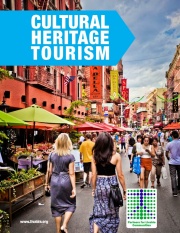
In our 37th year as an organization helping to empower communities with the tools to put them on the map as leaders in livability, Partners for Livable Communities is pleased to present this updated publication on cultural heritage tourism. As the tourism industry has boomed in the decades since Partners for Livable Communities began its cultural heritage tourism initiatives, communities have become increasingly eager to find ways attract tourists and capture the dollars they bring with them. However, when hard times come, it can be a challenge to persuade those among us of the benefits of preserving culture, heritage, and their artifacts from the past.
This guide represents the culmination of our experience and knowledge on an issue that has such a great potential for community development. Our hope is to demonstrate how cultural heritage is not just something to preserve for future generations, but is in fact an asset that can be leveraged to bring real economic benefits to the community.
Robert McNulty, president of Partners, can come to your community to speak about the necessity of developing a cultural heritage tourism strategy as well as share best practices and resources learned from Partners' decades of experience in this arena.
Download Cultural Heritage Tourism
Read more »
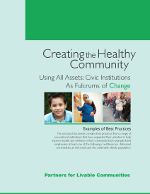
Partners compiled a collection of best practices of traditional community institutions incorporating health and wellness into their agenda and programming to improve community health. The best practices focus on improving the health of at least one of three constituencies: distressed communities, at-risk youth, and the vulnerable elderly.
Examples of institutions include arts and culture organizations, botanical gardens, community development corporations (CDCs), faith-based organizations, libraries, museums, public markets, and zoos.
Click here to download Creating the Healthy Community - Using All Assets: Institutions as Fulcrums of Change
Read more »
Terms:Aging, Community Building, Community Development, Community Engagement, Creating The Healthy Community, Cultural Institutions, Health & Wellness, Healthy Communities, Institutions as Fulcrums of Change , Intergenerational, Libraries, Program Areas, Public Health
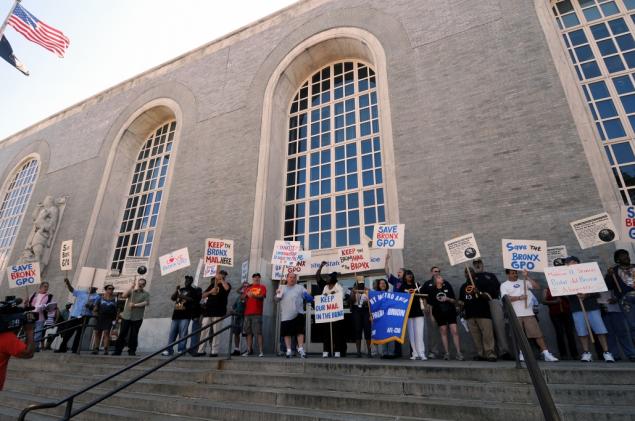 An article published in the Washington Post earlier this week highlights the dramatic decline of the United States Postal Service and the financial difficulty that it is facing today. Since the passing of the Postal Accountability and Enhancement Act (PAEA) in 2006, the postal service has started running massive deficits has been forced to lay off tens of thousands of workers. To remedy this financial mess, the USPS has increasingly started to sell historic Post Office buildings, often centrally located on valuable tracts of land, to raise money. An article published in the Washington Post earlier this week highlights the dramatic decline of the United States Postal Service and the financial difficulty that it is facing today. Since the passing of the Postal Accountability and Enhancement Act (PAEA) in 2006, the postal service has started running massive deficits has been forced to lay off tens of thousands of workers. To remedy this financial mess, the USPS has increasingly started to sell historic Post Office buildings, often centrally located on valuable tracts of land, to raise money.
Read more »
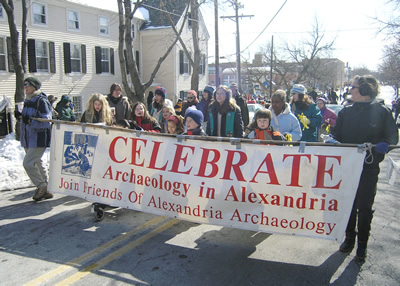
During the 1960s, Washington, DC and its surrounding communities experienced an urban renewal that saw a rebuilding of infrastructure and consequently required the destruction of a number of older buildings in the area. In Alexandria, an independent city a short distance from DC, the destruction of the old buildings uncovered an abundance of historical artifacts that shed light on the history of the area. Realizing that there was a plethora of previously undiscovered, culturally-important artifacts right beneath their feet, the city’s leadership created the Office of Historic Alexandria to try to cultivate and make sense of this new information.
Read more »
Terms:Community Building, Community Engagement, Creative Economy, Cultural Institutions, Heritage, Historic Preservation, IFC Best Practice, Museums, Public-Private Partnerships, Tourism, Washington, DC
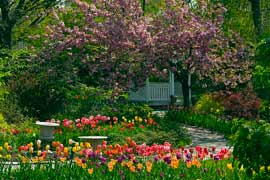
New York City is widely considered to be one of the most diverse places on the planet, with residents from hundreds of different countries living within close proximity of each other. Queens in particular has a broad mix of ethnic populations, which have lead some to consider it the most culturally diverse area in the world. Yet, when Susan Lacerte became the Executive Director of the Queens Botanical Garden, she noticed that the diversity of the borough was not reflected in the Botanical Garden’s attendance. To challenge that, Lacerte started The Ambassador Program to reach out to ethnic communities and find out what they wanted in their public garden.
Read more »
Terms:Arts & Culture, Community Building, Community Engagement, Cultural Institutions, Diversity, Healthy Communities, Heritage, IFC Best Practice, Multicultural, New York City, NY, Parks, Playgrounds & Gardens, Urban
|
|